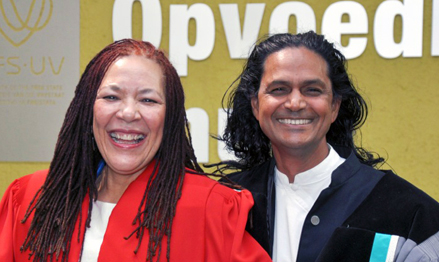Latest News Archive
Please select Category, Year, and then Month to display items
26 November 2020
|
Story Leonie Bolleurs
![]()
Mind Matters is a first for the UFS. It is a mental-health publication for students aimed at highlighting what matters most when it comes to your mind, life, and well-being. Some sections share how individuals in the top echelons of the UFS take care of their minds. Other sections focus on how to support your grey matter (i.e. your brain) and, consequently, improve your general functioning. Some parts discuss matters related to careers, well-being, finance, and self-development. We also provide news and resources that might matter to you.
Whatever your fancy, Mind Matters focuses primarily on why the health of your mind matters. Our minds and brains are the most powerful intelligence or apparatuses on the planet. A power like this needs to be wielded wisely, otherwise we may suffer much from our own neglect of our mental health. It’s not always easy, but it is important!
Mind Matters was possible due to the cumulative contributions, inputs, and work of numerous UFS professionals, especially within
Student Affairs. We are grateful and proud of each person involved. We endeavour to honour these efforts by continually improving and developing Mind Matters. Your feedback and voices are most welcome and will continue to inform what we do next.
Rhodes professor calls for accountability in teacher education
2013-11-14
|
 |
Prof Jean Baxen of Rhodes University and Prof Dennis Francis, Dean of the Faculty of Education of the UFS.
Photo: Stephen Collett
15 November 2013 |
Lecture (pdf)
“Our education system needs quality teacher education.”
This was the message from Prof Jean Baxen, Deputy Dean of Research at Rhodes University in Grahamstown. She delivered the Education Public Lecture on ‘The lives of children, citizenship and teacher education: challenges and opportunities’ at the University of the Free State’s Bloemfontein Campus.
Growing up in White River, the rural areas of Eastern Transvaal (as it was previously known), Prof Baxen took the audience on a journey of the imagination. She shared stories of how she and fellow learners walked miles to get to school and how her son found himself in a situation of being unsure about his own racial identity, questioning what it meant to be ‘coloured’. She also related stories of how teachers are not sufficiently prepared to mediate information on HIV/Aids.
These stories revealed how little teachers cared, and also how difficult and challenging it is for learners to cope in such teaching and learning environments – thus calling for quality teacher education.
She stressed the fact that quality teacher education is needed in South Africa to assist in curbing the challenges children and fellow citizens come across in our broader society. “It is important that, as teacher educators, we should groom teachers to find and understand their identity, sexuality, and also the world they live in. There is an urgent need for us to hold ourselves and others accountable and to not distance ourselves and make it someone else’s responsibility – it is our joint responsibility as citizens,” she said.
We need a pedagogy that would navigate and start formulating a language that we could use to face these challenges, she proposed.